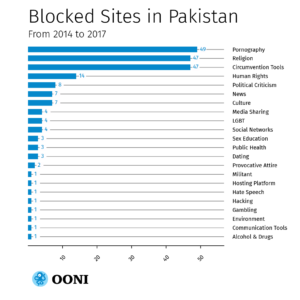We confirm detection of 210 blocked URLs in Pakistan. Explicit blockpages were observed for many of these URLs, while others were blocked by means of DNS tampering.
Many of the blocked URLs are considered blasphemous under Pakistan’s Penal Code for hosting content related to the controversial “Draw Mohammed Day” campaign. Geopolitical power dynamics appear to be reinforced through the blocking of sites run by ethnic minority groups.
Pakistani ISPs appear to be applying “smart filters”, selectively blocking access to specific web pages hosted on the unencrypted HTTP version of sites, rather than blocking access to entire domains. Overall, we only found ISPs to be blocking the HTTP version of sites, potentially enabling censorship circumvention over HTTPS (for sites that support encrypted HTTPS connections).
On a positive note, popular communications apps, including WhatsApp and Facebook Messenger, were accessible during the testing period. We find that the Tor network, which enables its users to browse the web anonymously, was mostly accessible.
Read the full report here.
Publication date: 18th October 2017
Publisher: Open Observatory of Network Interference & Bytes for All Pakistan

